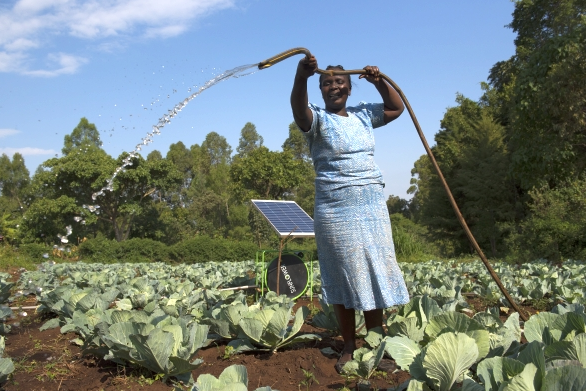Mapping of county-based agriculture and energy policy, regulations, projects and the key stakeholders driving them
Background
Africa Bioenergy Programs Limited (ABPL) is a company limited by guarantee registered in Kenya under the registrar of companies. ABPL stemmed from a national biogas program popularly known as Kenya Biogas Program (KBP). KBP was the lead national entity implementing the Africa Biogas Partnership Program (in Kenya) from 2015 to 2020 in partnership with SNV and Hivos. Africa Bioenergy Programs Limited (ABPL) is a social enterprise with a vision of creating a commercially viable domestic biogas sector and boost household’s access to and utilization of green energy and organic fertilizer for their farm to covering the entire bioenergy subsector with the aim of magnifying the role of clean energy in both rural and urban economic development. ABPL aims to support increase in adoption of biodigester installations among other bio-energy solutions, to enable scaled access to affordable clean energy for domestic use and increased agricultural productivity and soil amendment interventions. To date we have realized over 23,698 bio-digesters installed across the country and growing.
Introduction
The energy access conversations and the resultant determination of solutions have for a long term been held at high level platforms. The household communities, and more so the business communities have also been left to adopt solutions presented to them through fragmented supply chains, unguaranteed after sales support services, and from a point of lack of information or misinformation in decision making. Many adopters of clean energy solutions must be guided to know which solution best fits their specific needs and guarantees returns on their investments both in the short term in terms of utility and in the long term in terms of savings and/or profits. To realize scale in adoption of clean energy solutions, it is pivotal to demonstrate to the targeted consumers a business case that delivers direct benefit to their energy needs as well as how these solutions contribute to their empowerment economically.
ABPL modelled a marketing approach that sought to build effective marketing and business development structure for the bioenergy sector and centered on users; this approach is called the Biogas Marketing Hub model (BMH). ABPL is extending this model to a community marketing model, in order to include other farmers who are not members of farmer organizations. This involves and is centered on Aggregating Bio-energy Consumers for Development and Entrepreneurship (ABCDE). This model builds the capacity of user communities into Bioenergy User Hubs (BUHs) that can engage bio-energy technology suppliers and service providers targeting them to offer mutually beneficial services including training, distributorship, after sale services and marketing.
Organizing energy users of different strata, domestic or commercial, enables them to be at the center of decision making and participation in the determination of the present and future solutions that will deal with the increasing challenges of access to clean, affordable and appropriate energy solutions for different needs that these communities have, from the basics of heating and lighting, to the more complex energy needs around domestic and commercial productive use of energy.
With this consultancy, we seek to establish entry points for the BUHs who represent users of bio digesters to engage actively at county level with key stakeholders, and establish opportunities at county level that they can leverage to their advantage for enhanced access to clean cooking solutions.
Objectives:
- To identify all key stakeholders and their role in energy and agriculture interventions targeting communities in the specific regions
- Outline the key intervention areas/projects of the organizations working per county and the sector s of interest (agriculture and energy)
- Identify the partnership/collaboration opportunities between these organizations and community /community groups
- Establish the focal persons of these organizations, name contacts and role
- Identify the key policy and regulatory gaps in the county that are a barrier to promoting agriculture productivity and access to clean and sustainable energy by communities
Deliverables:
- Output county reports showing entry points for cooperation and policy engagements by ABPL through the BUHs
- List of projects and programs in the regions of interest and the opportunities for engagement
- Clear policy and regulatory gaps in the counties that community organizations can engage on to lobby for an enabling environment
- Clear list of recommendations per region on what short , mid and long term opportunities exist for the user hubs in the different regions
- Expected Outcome: Enabling policy environment, established partnerships, fundraising for local projects by CBOs
Assignment Process:
- Implementation work plan for the assignment for ABPL’s approval before commencement.
- The work plan should include the methodology to be used in the assignment.
- The consultant to submit an inception report that reflect the analysis of the Literature Review, the assessment methodology and time frame
- A copy of the raw data collected and used in the mapping,
- Mid-assignment meeting with ABPL to discuss and approve initial results and confirm next steps,
- Final report detailing the approach, mapping, findings, and recommendations
- Presentation of the findings and recommendations in MS PowerPoint format in English
- Active participation in a workshop where the results will be presented and discussed,
- Review and finalization of final report in light of the two workshops discussions.
The final mapping report should basically consider the following points:
Scope:
Geographic Scope: 7 regions, including; Western, Coast, Central, North and South Rift valley, Upper and Lower Eastern, and Nyanza.
Timelines:
The consultancy work will be expected to commence on the 1st of November and finalize by the 30th Nov 2022.
Interested consultants (individual /company) are required to send their narrative and financial proposal by 24th October 2022 to info@kbp.co.ke and copy to Swahome@kbp.co.ke

